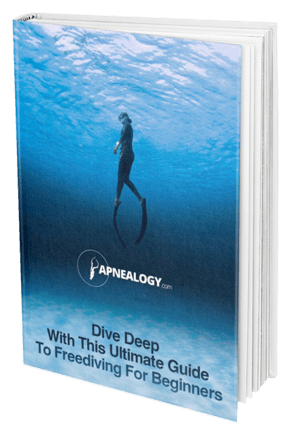- You are here:
- Home »
- Blog »
- Dive Deeper »
- How To Relax While Freediving – 13 Instant Calm-Diving Hacks
How To Relax While Freediving – 13 Instant Calm-Diving Hacks
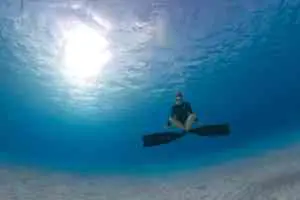
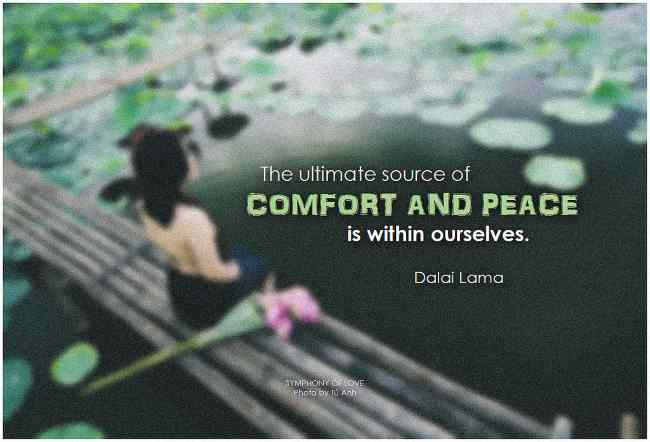
You already hold the keys to become a more relaxed diver. In this post you learn how to use them 🙂
Knowing how to relax while freediving is one of the single most important things any freediver could learn.
If you’re a freediver, and you can’t master your own emotions before and during dives…
Then your nervousness, fear and general discomfort will eat away at your potential as a freediver.
All too often, anxiety and fear act as barriers stopping you from fully enjoying the sport and reaping all it’s benefits. On top of this – whenever you’re not relaxed, ie: you’re nervous or scared – your heart rate shoots through the roof. This burns valuable oxygen, cutting your dives short and killing your total bottom time.
But it gets worse – research shows that people under the effects of stress, tend to make worse or different decisions than if they were relaxed.
This can be very dangerous for freedivers.
If you’re several dozen feet underwater and the effects of stress impair your decision-making process…you could end up making a completely irrational decision that endangers your life.
If you’re serious about freediving; you must master your mind and body. You must learn how to relax while freediving. Relaxation doesn’t just make the sport a more healthy, wholesome experience. It’s actually a necessity if you want to freedive safely long-term.
In this post, I outline the 14 best tips to stay relaxed while freediving, so you’re able to reach your full potential as a diver.
13 tips to help you stay relaxed while freediving
Before we get started on the list, please keep in mind I am not a doctor nor is the information given on this site meant to be used as medical information. The following tips are based on experience and research, not a medical practitioner’s advice.
Also, this list of 13 things to help you stay relaxed while freediving has been made under the assumption you already have high-quality freediving gear.
I can’t stress enough how important it is to use good gear you can trust. Knowing you’re using the right gear for your body and experience level, will leave you feeling more confident in the water, leading to higher levels of relaxation.
Make sure you have the right kind of weight belt, fins, mask etc before continuing.
Already got gear that’s maximizing your potential in the water?
Great! Let’s get into the 1st of 13 things you can do to stay relaxed in the water.
Control your mind
The single biggest reason why so many freedivers struggle to stay relaxed while freediving, is because they have poor control over their mind and thoughts.
But why does controlling your thoughts play such a big role in relaxation? Do thoughts really impact emotions that much?
The answer here is yes, your thoughts are strongly linked to the way you feel. This has even been outright stated by the American Psychological Association who said that your thoughts largely control your emotions.
So in other words…
If you think anxious, stressed out thoughts: you’ll feel stressed out.
If you think calm, relaxed thoughts: you’ll feel calm and relaxed.
They way you think, is the way you feel.
(oh, FYI – in this context; ‘think’ & ‘thoughts’ = the things you say inside your own head 😉 )

The way you think determines how you feel.
Just a heads up: this tip about mastering your mind & thoughts is kinda long, and we’re gonna delve fairly deep into this topic. But. I promise you it will be worth it. If you truly do master your mind, you’ll barely even need the other 12 tips in this post!
So keep reading, as this could very well change your freediving experience forever.
Anyways – so how exactly do your thoughts control how relaxed you are while freediving?
Well if you’re underwater in the middle of a dive…and you start thinking negative, fearful thoughts…
Your heart rate will rise. You’ll burn your oxygen supplies…and ultimately you’ll cut your dive short – or in worst case scenarios you’ll blackout before reaching the surface.
Sometimes you even become so consumed and paralyzed by your fear that you stop thinking rationally and you end up making bad decisions that endanger you even further.
But if you think positively, confidently and calmly – your mind will stay relaxed. Your decisions will remain unemotional and won’t be based on fear.
Your body won’t stress and your heart rate will stay nice and low to conserve oxygen. Your dives will be longer, and filled with more enjoyment.
Mindset is what separates pro freedivers from the beginners who just dabble in the sport and only really scrape the surface of freediving.
So how can you start changing your thought pattern to a more positive one?
What steps can you take in your next dive to stay relaxed and cool as a cucumber when you’re 100 feet + deep?
To answer these questions, let’s look at the psychologically behind how thoughts generate emotions.
(I know this is getting a little long-winded but believe me, if you learn this simple thinking ‘trick’ – your freediving life will change forever…so please bare with me!)
Almost 80 years ago, behavioral psychologists created the ABC model of Cognitive Behavioural Therapy. This model is a very simple way to understand how your thoughts create emotions based on the hundreds of events that happen to you in day to day life.
In the ABC model, there are several abbreviations used:
‘A’ = Activating events – any event in the world that happens to you.
‘B’ = Belief system – your thoughts about ‘A’ the Activating Events.
‘C’ = Consequential feelings you get – based on your ‘B’ – Belief systems (thoughts) about ‘A’ – the Activating Events.
In other words:
C = A x B
Your FEELINGS are created by how you THINK about the EVENTS in your environment.
Your perspective of what happens to you is what creates how you feel.
So how does this relate to staying relaxed while freediving?
Let’s use a freediving example that many beginner freedivers stuggle with…diaphragm contractions!
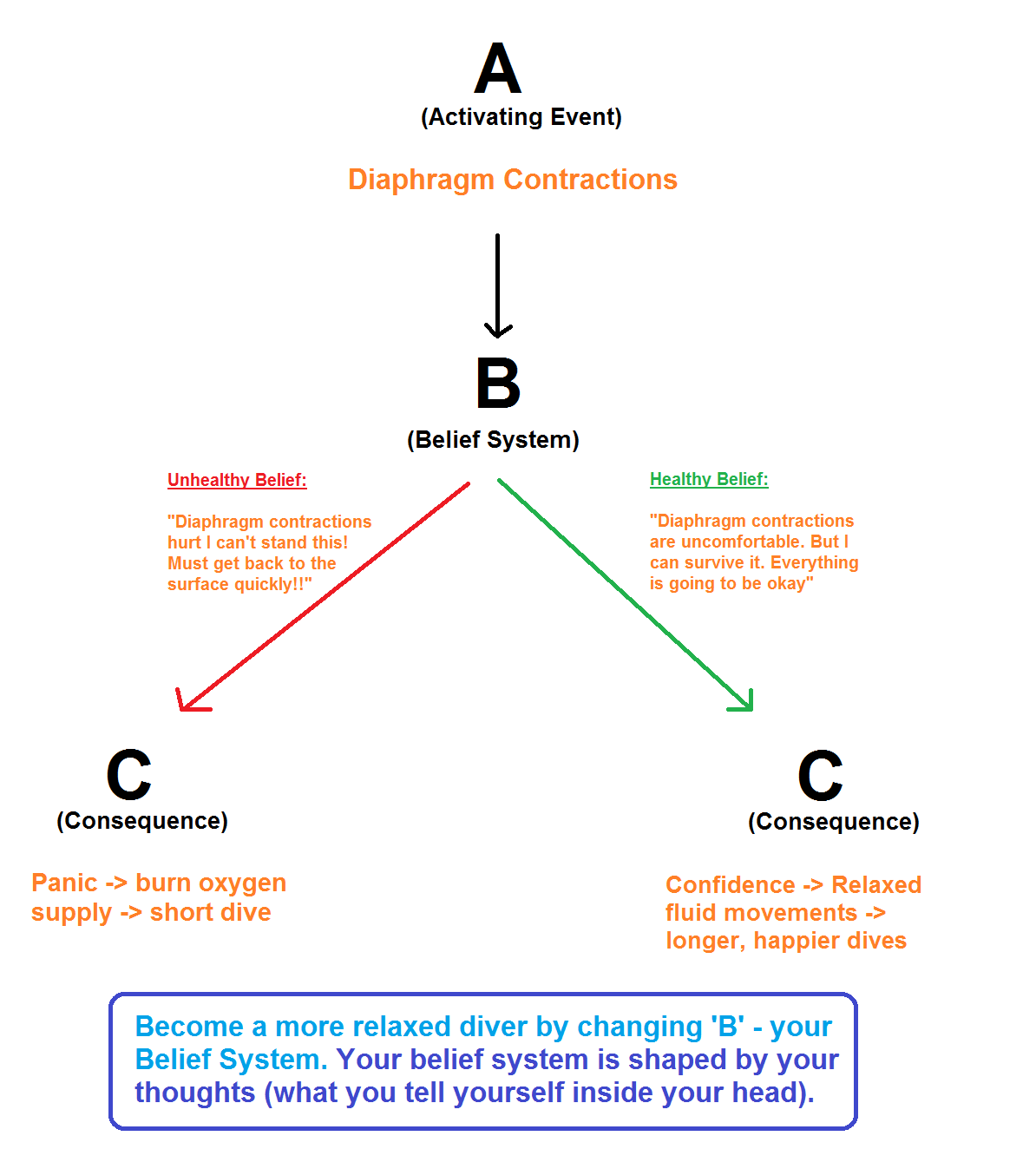
Your thoughts and beliefs about dangers in your environment directly control how relaxed you are
Let’s say you’re doing your dive and you start getting your diaphragm contractions. Instead of thinking about diaphragm contractions in an UNREALISTIC exaggeratedly negative way that creates FEAR and PANIC:
“Oh No – contractions! This is painful and I can’t stand it! I must get to the surface as soon as possible! Quick – I need to rush back up, or I could drown and die!”.
(maybe not that extreme but you get the idea 🙂 ).
Instead, change your negative beliefs and thoughts to more relaxed, LOGICAL and calm thoughts:
“I may not like diaphragm contractions because they are uncomfortable…but I’ve survived them before and have safely returned to the surface EVEN when I felt them during dives. I’m sure I’ll be fine as long as I stayed focused.”
Do you see how thinking like this almost guarantees you to be a calmer, more relaxed diver?
Ask any top freediver how they are able to dive so deeply. They ALWAYS respond saying mastering your mindset and thoughts are the most important skills needed to unlocking your full diving potential.
So I challenge you. Get out a piece of paper out right now.
Write down your biggest fears, anxieties and limiting beliefs when you’re in the water.
What are the silly, exaggerated stories you tell yourself that create unnecessary panic & fear?
- Are you scared a shark will eat you? Well, only 10 people per year globally get killed by sharks. You’re about 16.59 times more likely to die from falling out of bed when sleeping than you are of getting killed by a shark!
- Are you uncomfortable about going that extra 5 feet deeper than your record depth? Think it’s impossible? Why would you not be able to do that? You managed to achieve your current best depth by pushing yourself…surely you can add another 5 feet.
- Do you get nervous about your nervousness in pre-dive breathe-ups? Remember there’s absolutely nothing wrong about feeling a little nervous before a dive. It’s natural. It’s your bodies response to helping you if you run into danger. There’s no need to panic about it.
Once you’ve written down your crazy thoughts, fears and limiting beliefs…
I challenge you to think about them RATIONALLY. Look at them from a logical perspective and see how ridiculous and unlikely they are.
Once you dispute your crazy fears about freediving, you’ll find yourself slipping into calmer, more relaxed thinking patterns when diving.
Pranayama Yoga
One of the best tips I ever heard about how to stay relaxed while freediving, was to start practicing Pranayama Yoga.
Pranayama is a branch of yoga that focuses mainly on harnessing & controlling your breath. Controlling your breath can be used for a wide variety of causes and greatly benefits relaxation during freediving.
And…because of the ‘breath’ component of it, Pranayama is obviously very useful for apnea in freediving!
Some people use Pranayama Yoga to treat bad posture. Others use it for physical pains and for the mental health benefits. The latter – mental health benefits – is what we will be focusing on.
Specifically, I’m going to outline a very basic Pranayama Yoga routine for relaxation during freediving.
But first, what does Pranayama actually mean? Well, to answer this – I’ve always liked Yoga Journal’s definition, so I’ll list it below for you:
Prana means life force or breath sustaining the body; Ayama translates as “to extend or draw out.” Together the two mean breath extension or control.
With the definition out of the way, let’s get into how you can use Pranayama Yoga to relax during dives.
Specifically, we’re going to delve into the beginner technique called ‘Nadi Shodhana’. Nadi Shodhana is a type of yoga focusing on nostril breathing. The reason I recommend this is because:
1) it’s really easy to learn
2) it focuses specifically on boosting relaxation and reducing anxiety. Perfect for boosting freediving performance!
I did some searching around on the web and found this video on Nadi Shodhana. It’s the best and simplest video on the yoga method I’ve ever seen and strongly suggest watching it.
All credit goes to the creators of the video over at Do Yoga With Me.
I’ve outlined the steps below:
Step 1: Nadi Shodhana focuses on the nostrils, so make sure your nasal passages are clear.
Step 2: With your right hand; cover your left nostril with your ring finger, right nostril with your thumb. You can use your left hand if preferred, just reverse the finger placement.
Step 3: Curl your fingers under, so they are touching your palms.
Step 4: Position your hand in front of your nose.
Step 5: Cover your left nostril with your ring finger.
Step 6: Fully exhale. Breath should come out of the nostril that isn’t covered (your right nostril).
Step 7: Now, while your left nostril is still covered, inhale through your right nostril.
Step 8: Once you’ve fully inhaled, cover your right nostril with your thumb.
Step 9: Gently exhale out your left nostril.
Step 10: Now inhale through your left nostril.
Step 11: Repeat, alternating between each nostril (left / right) and fingers on your right hand (ring finger/thumb).
Using the above steps and video combined, you should be able to achieve a fairly relaxed state by harnessing Nadhi Sodhana.
Personally, when do this yoga technique, I ALWAYS feel a gentle calmness wash over me after about 20 seconds of alternating between nostrils. It’s almost uncanny how it’s a like a switch you can flick for instant calmness!
This is one of the better kept freediving relaxation techniques of the freediving community. I strongly suggest you try it before you next dive.
Not only will this technique lower pre-dive nervousness, but it also helps with breath-coordination & apnea, which is obviously helpful for a freediver like yourself!
Master your breathe-up
If you’re anxious, stressed out and uncomfortable during your breathe-up…it’s only going to get worse during your dive.
The best way to stay relaxed during your breathe-up, is to keep it as simple as possible.
A lot of pro freedivers have much more complex breathe-ups like hold in for 5 seconds, then every 3 exhales inhale for 10 seconds etc – but I find all that too overwhelming!
I believe that following such a regimented breathe-up process before diving, only builds up and adds to your pre-diving nervousness. You get so caught up in perfecting it and following every little rule that you start to panic. Too much stress!
I believe the perfect breathe-up is the one that keeps you as relaxed as possible, while still filling your lungs to close to their capacity.
Below is a nice, simple & relaxing breathe-up any freediver can easily follow:
Step 1: Once in the water, slowly and steadily breathe through your snorkel.
Step 2: Focus on breathing slowly and deeply into your belly. Make sure you’re wearing a rubber weight belt (not nylon!). If you don’t know why it’s so important to only wear rubber weight belts for your breathe-up, then I suggest clicking here to learn why.
Step 3: In the same inhale; expand your chest gently and fill it slightly with air as well.
Step 4: Exhale slowly and gently. While exhaling, release all tension in your body. Start up in the neck and work your way down to each muscle group, finishing with your toes.
Step 5: Repeat the above steps about 10 – 15 times.
Step 6: Let go in a final exhale, one more deep inhale and then begin your dive.
Listed above, is a breathe-up technique that is simple to follow and will help keep your mind nice and clear throughout your dive.
Meditation
As freediver reading this, you know how amazing it can be when you’re underwater, several dozen feet down and completely consumed in the underwater world. When you’re at that point, you experience a rare, almost enlightening zen-like calm wash over you.
You feel completely at peace and at one with the world.
This refreshingly calm way of being is what so many freedivers get obsessed with and end up chasing week after week.
But sometimes that calmness and complete silence makes the thoughts in your head get louder and louder. Sometimes it gets to the point where complete silence isn’t relaxing anymore and ends up stressing you out.
I’ve found that the perfect cure to being at peace when ‘loud’ thoughts rush through your mind…is to meditate.
I’ve written an entire separate post on meditation techniques for freediving here – you’re welcome to check it out.

Meditation blended with rational thinking is the ultimate combination to calm, deep freedives.
However, if you want a quick overview of just a basic meditation tehcnique: here’s a technique to get you started….
And remember meditating in order to relax when freediving can be done while descending / ascending or before/after your dives.
This technique focuses on meditating during your dives.
How do you do it?
1) Simply start by becoming acutely aware of your senses: what do you feel, taste, smell, hear and see?
2) Now try to keep that focus on your senses. Study all the different sensations your body is experiencing. Try not to think about anything else.
Ignore the past and the future. Be here in the moment. Look at the way the sun shines through the water. Look at how the seaweed bobs and sways with the water. Pay attention to the coolness of the water against your skin.
3) If you get distracted, gently redirect your thoughts back to your senses.
Doing this simple meditation technique, will distract you from your thoughts running wild in your mind. It will help you feel relaxed and at peace when you freedive – so you can enjoy a longer bottom time and a more enriching diving experience.
Modelling
And no – I don’t mean stripping your wet suit off and jumping into a photo shoot 😉
I’m talking about cognitive and behavioral modelling. Yep it sounds like weird psycho-babble. But its not; it’s really quite simple.
All it really means is: find another freediver who seems relaxed during most of their dives. This person can take stressful situations and doesn’t really seem all that phased by it.
In this scenario it could be anyone from a fellow freediving buddy, to a freediving expert, trainer or champion. Just make sure they all share the same trait of being relaxed and thriving under pressure when in water.
Found that person? Yep? Great!
The next step is to model or replicate the way they think and act.
We do this because…
When you act like you’re relaxed…you become relaxed.
Pretending you’re calm and relaxed…signals to your subconscious that the situation you’re in is indeed relaxing.
Then with enough repetition, your subconscious will start to believe it and soak it up like a sponge.
And then it will become so knit with habit and thought and emotion that it will manifest into your own reality.
And yes, this really is just a more sophisticated version of ‘fake it til you make it’! But it really does work.
So how do you model someone? Study their thoughts and behaviors.
To model how they think…get inside their head. Quiz them on how they deal with and how they think about stressful freediving situations. Then whatever they answer, remember what they said and implement it in your thinking pattern.
Interrupt your original thoughts you want to change, and instead think exactly like they do in that situation. With enough repetition, this will become your belief system and you will eventually adopt their care-free and relaxed attitude…to any stressful situation in freediving.
To model their behavior: Adopt their body language. Study what their body looks like in a situation you consider to be stressful. Now look at how calm they are. Now next time you’re in that situation, simply act as if you are them – cool, calm and collected…and you will become calm and relaxed in the water.
In summary: start acting as if you’re the most relaxed person in the world, and you’ll surely become it.
Shift your focus
A quick and easy tip to stay relaxed when freediving: Focus only on what you can control.
Don’t bother stressing about the things you cannot control!
If something can affect you, but you have NO ability to influence whether or not it happens…you have nothing to worry about.
Your fate is already decided and in someone (or something) else’s hands. Not only does this apply to freediving, but also to life.
Just like you can’t control whether or not there is a recession or whether or not it rains tomorrow…you also can’t control whether or not some freak accident like a tsunami happens when you’re in the water. So you don’t have to worry about it.
So what do you focus on then? Focus on what you can control. Focus on your finning technique. Or on the fish around you. Focus on having fun and being in the moment.
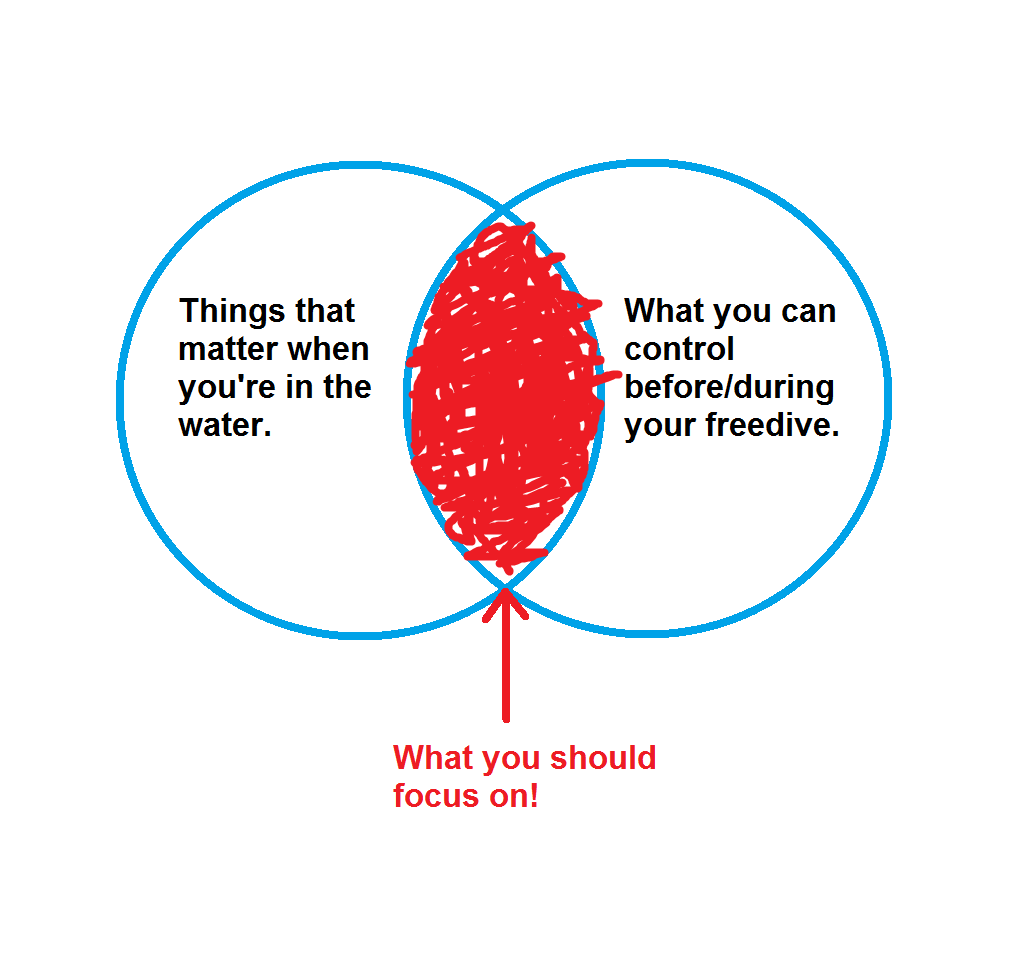
Stoicism 101: Focus on what makes a difference and on what you can control!
Also to add to what you should focus on: stop being so results oriented and heavily scrutinizing your performance!
Not only does this suck the fun out of freediving, but it will also bring you back to worrying and take you out of a relaxed state…and ultimately stop you performing well!
Do yourself a favor next time you freedive, and only focus on what you can control. Not only will you be more relaxed…you’ll also have more fun!
Master your urge to breathe
The root cause of a lot of freedivers’ anxiety and restlessness during dives, is often due to the overwhelming urge to breathe (AKA – rising CO2 levels).
After enough time breath-holding – say about 1 – 1:30 minutes for a beginner freediver – you’ll feel like breathing. It will become such a strong feeling that it will completely distract you and push you out of relaxation.
There are two ways to overcome the unsettling and uncomfortable urge to breathe:
First way to fight the urge to breathe: simply distract yourself.
Focus on the gentle noises of your fins, or focus on the feeling of your mask strap against your head.
The idea here is clear: you’re trying to distract your self from the discomfort of needing to breath and you’ll find yourself slipping into a more relaxed state of mind.
Second way to fight the urge to breathe: Push through it until you get desensitized to it. This takes time and is something top freedivers have mastered.
If you do something uncomfortable enough, and you do it repeatedly, you won’t find it uncomfortable anymore. Ask any veteran freediver and they’ll tell you they don’t get phased or even uncomfortable when they feel the urge to breathe.
You can delay your urge to breathe and associated contractions through sheer will power.
Each time you push through your contractions, you will realize they are nothing to panic about and that you’ll be fine for quite some time after they’ve passed.
Positive Visualization
Positive visualization is a way of boosting your hope, relaxation and performance by envisioning yourself doing well in a particular task or outcome.
For example, lets pretend you’re back in high school and about to take a test on Ancient Greek history.
Now lets pretend you’ve studied for weeks and weeks and you know everything there is to know about Ancient Greece. You know all the unit’s content like the back of your hand and you’ve studied previous papers to get a good idea of the type of questions you’ll be asked.
All together you’re super prepared.
But.
Throughout your Ancient History test you start to worry. You consistently stress out about how well you’re going to score.
It dominates your thoughts.
Your mind becomes so occupied with the possibility of failing, that you can’t even focus on answering the questions properly.
Your mind goes blank.
And even though you studied and knew all the content… you hand in an almost completely blank test paper and fail the test.
Do you see what’s happened here? You knew all the content to your Ancient Greek History test. Yet you were so preoccupied with failure, that you couldn’t even think straight.
You focused so intently on the negative outcome, that it manifested into your life. This is negative visualization.
It cripples not just academics, but thousands of freedivers per year and robs them of their potential.
Now, what if you applied positive visualization to do well in your test?
In this case, you could imagine yourself vividly, creatively and in full vibrant colors succeeding at the test. See yourself answering each question easily and getting 100%.
Feel the amazing emotions and excitement as you gun down each question with the perfect answers.
If you did this you’d surely do much better. You’d tap into your fullest potential as a student.
Now apply this to freediving. Think about a particular part of your dive that worries you. Got it?
Now imagine yourself doing well in it. Make the picture large, bold and incredibly clear in your head. See yourself succeeding in it. Feel the emotions you get when you complete the hardest part of your dive.
This is positive visualization. Not only will it raise your confidence and relaxation during dives, but research shows positive visualization also ingrains correct muscle memory needed to perform well in sport.
Listen to relaxing audio before your dive

Mantra meditation can be a powerful way to switch brain waves to a more relaxed state.
Most of the freediving relaxation techniques I’ve covered in this post so far, revolve around controlling your thoughts. But one other thing that works quite well for relaxation, is to listen to relaxing sounds 10 – 15 minutes before your dive.
So which relaxing sounds do you choose? Any of the following work:
- You can sit quietly on the shore/deck of your boat and listen to the sound of the seagulls, crashing waves, the slow humming of your boat engine or any other soft, recurring sounds in your environment.
- You can listen to proven relaxation audiotapes. Simply googling ‘relaxation tapes’ will give you plenty of options.
- You can get into a meditative state, and then repeat some sort of mantra to yourself. This is known as Mantra Meditation.
The best way I’ve found to use sound to relax, is to combine it with meditation.
Below is a simple way to get started:
Step 1: Sit in a quiet room or area with no noise or distractions. You may choose to set a timer for 10-15 minutes to cover the entire meditation process.
Step 2: Inhale and exhale deeply 3 times in a row.
Step 3: Start your audio or music and then close your eyes.
Step 4: Begin breathing into your stomach, then keep inhaling all the way up to your chest. Each breath should be a normal-sized regular breath (you shouldn’t be exerting yourself at all!). You should have a normal breathing pace going.
Step 5: Come into your 5 senses. Experience each sense fully: Taste, smell, touch, sound and vision. For the last sense – vision – you might be wondering what to look at. I usually just keep my eyes closed and pay attention to how dark my sight is. Usually you get slight purple/green flashes/images rolling around when you close your eyes – I also focus on them.
Step 6: Focus on each of your 5 senses for what seems like 30 seconds each. Don’t bother setting an alarm for each, just estimate.
Step 7: Start concentrating on the way your breath feels in your chest and throat. Feel the air moving in and out of your nose and hitting your lips. Do this for about 5 minutes.
Step 8: Open your eyes and then deeply inhale and exhale 3 times. Feel free to sit and listen to your audio for another 1 minute or until you feel like stopping.
Listed above is a simple yet effective way to ‘shift gears mentally’ to a more relaxed state of mind. Prepping your mind with relaxing audio is powerful for boosting freediving performance and enjoyment!
Freedive in conditions you are comfortable with
Before jumping in the water, scan your environment for anything that could be dangerous and cause you to worry. Remember, you’re meant to be relaxed when freediving.
Jumping in the water and feeling uneasy because of obvious dangers you’ve neglected, is just plain silly.
Also, make sure you have a good freediving buoy to rest on if the water gets rough.
Here are some common conditions that cause freedivers to stop being relaxed and instead stress out during dives:
- Rips: Powerful, unexpected currents and tides that drag you away from your original spot in the water. These can not only be very dangerous and cause drownings, but will also get you out of your relaxed freediving state.
- Diving when you’re ill: I shouldn’t have to write this, but unfortunately I do! Some freedivers are so keen that they even dive when they’re sick, hungover or have colds. All these sicknesses not only reduce freediving performance, but will cause you to worry as you’ll be super uncomfortable!
- Dangerous marine life: if you’re diving in a new location, make sure to research any dangerous marine life. This doesn’t just include sharks. Many of you reading this know that sharks aren’t even that dangerous. Of more concern are animals that carry poisonous stings: blue box jellyfish, sea snakes, stone fish etc. Do you research before jumping in the water and you won’t find yourself worrying!
- Cold water: Freediving in incredibly cold waters is surprisingly fun! But it’s certainly not for everyone. If you think it may pull you out of your relaxed state and cause you to worry when diving in icey waters, maybe better to sit this one out! As an alternative, you can invest in high-quality gear that keeps your warm (like an open-cell freediving wetsuit).
Get experience under you belt
One of the biggest myths in the freediving community, is that top freedivers like Tanya Street, Jacques Mayol & Herbet Nitsch and all other veteran freedivers were born confident in the water.
This is a myth that just won’t die. Freediving, like any other skill, is something you need to practice. Once you practice enough and experience many, many dives, you’ll become more competent and more confident. As your confidence in the water grows, your fear shrinks and you’ll find yourself becoming more and more relaxed!
Experience takes a while to cultivate…but it’s definitely well worth the journey when you can comfortably dive 100 feet+ without anxiety…and instead experience the beauty of the underwater realm at that depth.
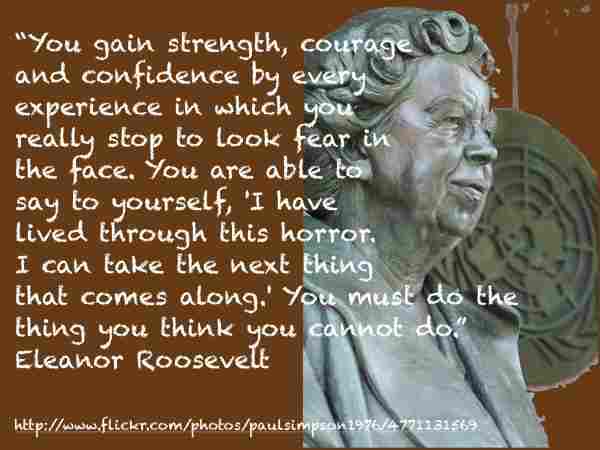
The more experience you gain, the more relaxed you’ll be when diving.
Healthy diet and no smoking, drinking or drug use
If you have the time; here is a list compiled by the writers over at deeperblue, of all the foods to avoid before/during/after freediving.
In summary – try to avoid all foods, drinks and diets that are:
- Dairy-based foods: Foods that stimulate mucous production like yogurt and milk can cause difficulties when equalizing. If you can’t equalize properly when diving, then you’re likely going to struggle to stay relaxed!
- Cause inflammation: A diet that causes inflammation can not only interfere with your ability to equalize your sinuses, but can also cause digestive issues. Both contribute to lowering your relaxation when freediving. Avoiding things like sugar, trans fat and saturated fats is a good way to avoid inflammation from your diet.
- Avoid all cigarettes. If you’re a cigarette smoker, you might stress during apnea knowing your tobacco habit is actively working against your lungs and breath-holding ability. This can break your relaxation and cripple your ability to freedive deeply. I strongly suggest switching to something that’s healthier for your lungs – something like vapes or e-cigs – will be much better for your lungs for freediving and won’t cause you to stress.
- All foods & drinks that raise the heart rate: A raised heart rate will burn through your oxygen supply faster. Not only will having your heart racing in your chest pounding agianst the walls of your ribs cause you to burn oxygen…but it will also cause you to stress out during dives.
- Avoid all drugs that aren’t approved by a medical professional: Avoid things like coffee, other stimulants, depressants etc. And as for drugs – you never know how your mind will respond under the effects of a drug when freediving…some people freak out just knowing they’ve taken drugs before freediving! Long story short: Only take drugs that your doctor says are okay to freedive with.
Dive with a trainer/instructor and with safety divers
This should be common sense to all freedivers, but I will repeat it to make it 100% clear: you should ALWAYS dive with another person watching you. In the event you get ascent/shallow water blackout; you want another diver (preferably more than one) to swim down and bring you to the surface safely.
Knowing you’ve got buddies watching your back throughout every dive, is a sure-fire way to boost your relaxation when diving.
Lastly, if you’re a beginner: definitely dive with an instructor or highly experienced friend. This will remove a great deal of anxiety and you may even learn a thing or two!
About the Author Gerrie van Niekerk - Apnealogy
Gerrie is a passionate Freediver, Spearfisher, Digital Marketer, and author for the Apnealogy website. Gerrie is an SSI Level 1 certified Freediver who loves geeking out about freediving and spearfishing gear and lives for his family and adventure.

